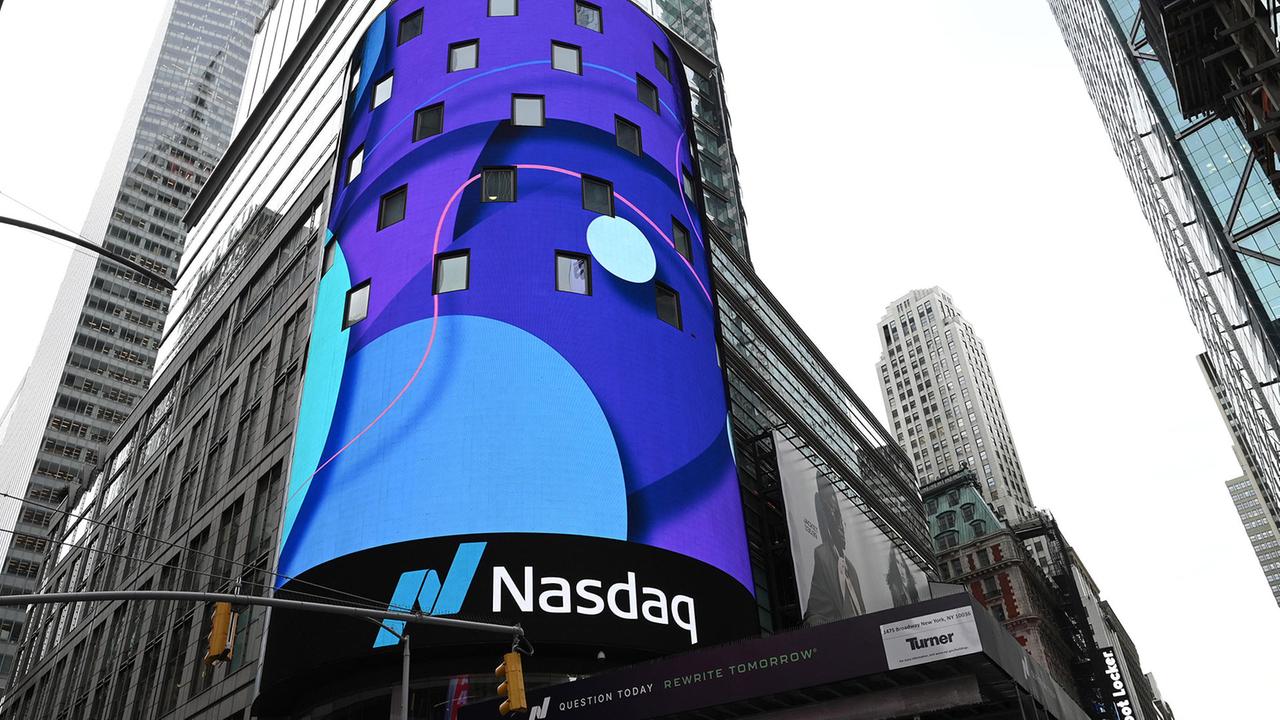market report
Despite great uncertainty about future interest rates in the country, the tech rally on Wall Street entered a new round. The AI euphoria pulled the entire market up.
After a nervous start to trading, Wall Street investors regained their courage over time. Above all, the seemingly endless run of AI stocks brought the technology-heavy Nasdaq indices to new highs, which boosted the entire market. Even renewed warnings from the ranks of the Federal Reserve (Fed) about the bank's future interest rate policy could not stop the AI euphoria.
In the end, the Dow Jones Index, the leading index of standard values, also closed at 38,778 points, up 0.49 percent. That was not what it initially looked like. The two heavyweights Apple and Microsoft, which gained and are included in both the Nasdaq indices and the Dow, played a major role in this.
Apple recently jumped on the bandwagon after new iPhones were to be equipped with AI applications, and Microsoft, today at a new record high of $450.94, is already considered a major AI player due to its stake in the AI software house OpenAI.
The Nasdaq 100 index (at 19,977 points) and the Nasdaq Composite index (17,935 points) as well as the broad market S&P 500 index (5,488 points) marked new highs during the course of the day. The indices thus continued their recent record run. The Nasdaq Composite index ended trading at 17,857 points, 0.95 percent higher, while the Nasdaq 100 closed at 19,902 points, 1.24 percent higher.
“There is no real interest in selling at the moment because people are assuming that the momentum will continue and stocks will continue to gain,” said Daniela Hathorn, analyst at Capital.com. However, there is concern that the rally is mainly being driven by a few stocks. Investors are hoping for new clues about the future interest rate path of the US Federal Reserve from fresh economic data over the course of the week, such as retail sales in May or industrial production.
Investors are weighing the prospect that the US Federal Reserve could begin monetary easing later this year against fears that the recent rally in stocks is showing signs of overdoing it, market sources said.
Meanwhile, central banker Neel Kashkari, president of the Minneapolis Fed, believes it is realistic that the monetary authorities will lower the key interest rate in December. However, it is necessary to see further evidence of a decline in inflation, he said in a CNBC interview. The bond market is trending lighter, as it did at the opening, with the yield on ten-year US bonds rising to 4.29 percent. The less price-sensitive two-year bonds are offering their buyers just over 4.75 percent.
Among individual stocks, shares in the semiconductor company Broadcom continued their recent record rally. They ended up up 5.41 percent to $1,828. This was after they had already gained around a third in value since the beginning of June.
Shares of competitor Micron also rose significantly by a good 4.5 percent. Shares of market leader Nvidia, on the other hand, were slightly lower after previously running from one high to the next. Along with Nvidia, Broadcom is considered one of the main beneficiaries of the AI hype. Last week, shares jumped significantly after Broadcom generated enthusiasm among investors with strong quarterly figures and an announced stock split. This also resulted in numerous price target increases from analyst houses.
After a significant correction at the end of last week, the DAX stabilized at the start of the week. Although the losses brought bargain hunters to the fore, the German leading index only made up a small part of its recent losses.
In the end, the DAX closed at 18,068 points, 0.37 percent higher. This stabilized the index somewhat, but it is currently not good enough to do more than that. An initially strong countermovement in early trading as a reaction to the losses of the last two trading days quickly fizzled out again over the course of the morning. Overall, the index moved between 17,969 and 18,149 points. Last Friday, the German leading index slipped by 1.4 percent to 18,002 points, and in two days it had lost 3.7 percent.
“After the bout of weakness last week, the German stock index was trying to limit the damage today and the index succeeded in doing so,” said Konstantin Oldenburger, analyst at broker CMC Markets. However, there was no recovery in sight for the MDAX, which lost around 0.9 percent and thus slipped just below the 25,500 point mark.
In addition to the political uncertainty in France and the discussion about a tariff dispute between the EU and China, the continued reluctance of the US Federal Reserve to cut interest rates is currently preventing investors from taking risks.
“The DAX has lost a good 1,000 points since mid-May,” writes Jochen Stanzl, market expert at CMC Markets in his daily commentary. “Not only a trade dispute with China, but also an intra-European dispute over the punitive tariffs imposed on Chinese electric vehicles is looming. The new elections in France are also worrying,” is his assessment.
The neighboring country is threatened by a massive shift to the right, which will further worsen the already strained state finances. Yields on the French bond market have already risen significantly, a clear alarm signal. The rating agencies have also already issued warnings.
The situation on the stock market is therefore likely to remain tense at least in the coming days: “Investors must expect significantly stronger market fluctuations between now and the election and in the weeks after than recently,” commented Ulrich Stephan, chief investment strategist for private and corporate clients at Deutsche Bank. “However, many expectations and concerns are now likely to have been factored into the prices of stocks and bonds.”
Current economic data from China is also unlikely to please investors due to the export orientation of the German economy: Chinese industrial production weakened in May and missed analysts' expectations. Although it rose by 5.6 percent year-on-year, it slowed down from 6.7 percent in April, according to official data from the National Bureau of Statistics (NBS).
Retail sales, on the other hand, were a positive surprise. They rose by 3.7 percent in May, 1.4 percentage points more than in April. Analysts had only expected an increase of 3.0 percent.
The example of Adidas is currently showing how important the Chinese market is. The shares of the Franconian sporting goods giant continued to fall today in the middle of an otherwise promotionally effective major sporting event such as the European Football Championship and are among the biggest losers in the DAX. The shares slipped below the support in the area of the 220 euro mark and lost around 2.6 percent.
As the news agency Bloomberg reported, the sporting goods manufacturer is currently investigating anonymous tips about corruption by individual employees in China. Jürgen Molnar, capital market strategist at broker RoboMarkets, pointed out the importance of the Chinese sales market for Adidas. The allegations could jeopardize the Herzogenaurach-based company's goal of finally regaining a foothold in the Middle Kingdom after the massive slump in the past four years.
“For the chance of a continuation of the upward trend, the issue should be quickly cleared out of the way,” the expert continued. At the beginning of June, the shares had reached their highest price since February 2022 at over 236 euros. Since the beginning of the year, however, the increase still amounts to almost 18 percent.
The euro rate stabilized today at 1.0732 dollars. The common currency had fallen to its lowest level since the beginning of May on Friday. The background to this is the persistently high interest rate expectations in the USA, but also the political uncertainty in France. The European Central Bank (ECB) set the reference rate at 1.0712 (Friday: 1.0686) US dollars.
US economic data provided little impetus at the start of the week. Industrial sentiment in the US state of New York brightened considerably in June.
Oil prices have continued their recent recovery at the start of the week. In the evening, a barrel (159 liters) of the North Sea Brent variety cost a good two percent more, as did the price of a barrel of the US variety West Texas Intermediate (WTI).
At the start of the week, crude oil prices rose to their highest level since the end of May. They were supported by the slightly weaker dollar. The generally more stable mood on the stock markets also affected the oil market. However, mixed economic data from China tended to weigh on prices. According to government figures, corporate investment and industrial production were weaker in May.
Last week, crude oil prices had already recovered from their significant losses at the beginning of the month. At the beginning of June, the expanded oil cartel OPEC+ planned to increase its production again somewhat from autumn onwards. The change of course came as a surprise to many market participants, even though only a portion of OPEC's total production was affected.
The diagnostics specialist and laboratory supplier Qiagen wants to grow faster and increase profitability in the coming years. The DAX group announced today at a capital market day that it is aiming for annual growth of around seven percent on average by 2028 at constant exchange rates. The company also announced that it intends to return at least one billion US dollars to shareholders between 2024 and 2028.
The market share of pure electric cars in Germany in new registrations fell to twelve percent in the first five months of the year – compared to 14.3 percent in the same period last year. According to the Federal Motor Transport Authority, the number of newly registered battery-electric cars fell by 16 percent to just under 141,000. The market leader from January to May was Volkswagen with just under 20,000 electric cars, followed by Tesla and BMW. With the end of state subsidies for electric vehicles at the end of last year, demand fell noticeably. Qiagen shares rose in the DAX.
The medical technology group Carl Zeiss Meditec has cut its outlook due to an unexpectedly slow recovery in the equipment business. Business in April and May fell short of the previous year, the company announced.
For the current financial year (until the end of September), Carl Zeiss is therefore expecting sales of around two billion euros. Previously, the company had targeted between 2.1 and 2.15 billion euros. The operating result (EBIT) is expected to be between 215 and 265 million euros, well below the previous target of a comparable level to the previous year of just over 348 million euros. In the MDAX, the Zeiss share dramatically lost around a fifth of its value, putting it clearly at the bottom of the index.
Pfeiffer Vacuum will soon have to leave the SDAX. According to the German stock exchange, the vacuum pump manufacturer did not publish its quarterly financial report on time. The stock will therefore no longer be included in the index of smaller stocks from Monday (June 24), the stock exchange operator announced. The announced removal of Thyssenkrupp Nucera is therefore null and void. The electrolysis specialist will remain in the SDAX.
…




